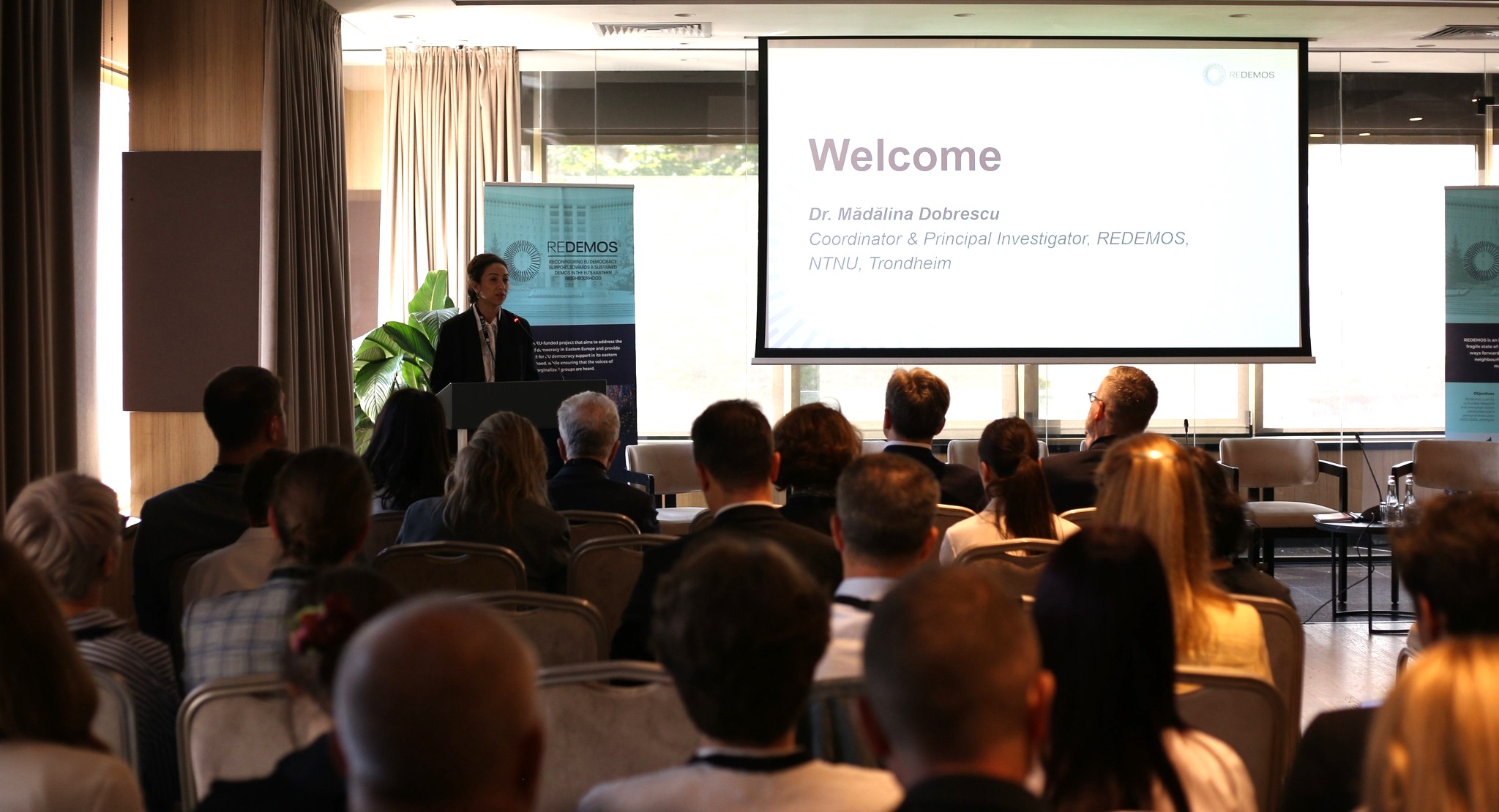
On June 7, 2024, in Chisinau, the Intermediate Conference on "Eastern Europe and the EU's democratic support during wartime" was held, an event organized by the Norwegian University of Science and Technology in partnership with Institute for Development and Social Initiatives (IDIS) "Viitorul", within the REDEMOS project - part of the Horizon programme - implemented by a number of eleven organizations from ten European countries.
The event brought together leading international experts, officials and researchers to discuss democratic development in Eastern Europe in the current context of the war in Ukraine and the role of the European Union and other international actors in supporting democracy in the region.
Dr. Mădălina Dobrescu, Coordinator and Principal Investigator at REDEMOS, NTNU, Trondheim, officially opened the event and welcomed all attendees. The keynote speech was delivered by the Prime Minister of the Republic of Moldova, Dorin Recean, emphasizing the importance of solidarity and democratic support in these challenging times.
The first panel, titled "Democratic Development in Eastern Europe in Light of Russia’s War on Ukraine," was chaired by Prof. Dr. Tobias Schumacher, Professor of European Studies at NTNU and Deputy Coordinator of REDEMOS. Esteemed speakers included Ion Guzun, member of the Supreme Council Magistracy of the Republic of Moldova; Franak Viacorka, Chief Advisor to Sviatlana Tsikhanouskaya, President-elect of Belarus; Dr. Leyla Yunus, Director of the Institute of Peace and Democracy in the Netherlands; Prof. Dr. Richard Youngs, Professor of International and European Politics at Warwick University; Dr. Iryna Solonenko, Programme Director for Ukraine at the Center for Liberal Modernity in Berlin; and Nino Dolidze, Executive Director of the International Society for Fair Elections and Democracy in Tbilisi. The discussions focused on the impact of the Ukraine war on democratic processes in the region and the necessary measures to support democracy.
The conference continued with the second panel, "External Images and Self-perceptions of the EU, Its Actions, and Visibility in Eastern Europe," moderated by Rikard Jozwiak, Europe Editor at Radio Free Europe/Radio Liberty. Panelists included Natalia Gavrilița, member of the Supervisory Board of the National Bank of Moldova; H.E. Ambassador Jānis Mažeiks, Head of the EU Delegation to Moldova; Dr. Koba Turmanidze, President of the Caucasus Research Resource Center in Tbilisi; Prof. Dr. Tina Freyburg, Chair of Comparative Politics at the University of St. Gallen; and Ion Manole, Executive Director of Promo-Lex in Chișinău. The panel examined external and internal perceptions of the EU and its actions in the region.
Lunch was followed by a presentation on "Diagnosing Political Regime Development in Eastern Europe through REDEMOS Tools: The Case of Moldova" by Prof. Dr. Marianne Kneuer and Dr. Sergiu Bușcaneanu from TU Dresden, providing a detailed analysis of how REDEMOS-developed tools can be used to understand the political development in Moldova.
The final panel, "Beyond the EU: The Role of Other International Actors in Eastern Europe and the Return of Geopolitics," moderated by Dr. Ragnar Weilandt, Research Fellow at REDEMOS, NTNU, featured H.E. Ambassador Thomas Mayr-Harting, Special Representative of the OSCE Chairperson-In-Office for the Transnistrian Settlement Process; Dr. Stanislav Secrieru, National Security Advisor to the President of Moldova; Laura Hruby, Deputy Chief of Mission at the U.S. Embassy in Moldova; Dr. Mareike Ohlberg, Lead at the Stockholm China Forum, German Marshall Fund; and Michaela Guerard Šimák, Head of the NATO Liaison Office in Moldova. This panel explored the role and influence of other international actors in Eastern Europe and recent geopolitical shifts.
The conference concluded with closing remarks by Dr. Tobias Schumacher, followed by networking coffee, providing an opportunity for participants to discuss and share their impressions.
This event served as an important platform for discussions and idea exchanges among experts and officials in international politics, aiming to promote democracy and stability in Eastern Europe during these turbulent times.
The international research project ”REDEMOS: Reconfiguring EU Democracy Support – Towards a sustained demos in the EU’s Eastern Neighbourhood”, which runs from January 2023 until December 2025, is directed by the Norwegian University of Science and Technology (NTNU) and brings together a total of 11 academic and research institutions – six universities, four independent think tanks (including IDIS "Viitorul") – and one small and medium-sized enterprise from across Europe. This multi-annual, multi-million research project takes an in-depth look at the full range of political and governance regimes in the EU's eastern neighbourhood, from flawed democratisation in some countries to democratic regression and even repressive authoritarianism in others. REDEMOS aims to break new ground and suggest a comprehensive and transformative overhaul of the conceptualisation, policy-making and implementation of democracy in the EU's eastern neighbourhood.
The overall objective of REDEMOS is to develop a set of innovative policy tools to make EU democracy support policies more efficient, effective and sustainable. The anticipated project outputs will range from a holistic dataset summarising past democracy support actions and programmes to a set of working papers, policy documents, blog articles, visual reports, as well as workshops, conferences and more. Together with the participatory nature of the REDEMOS project, its results will be geared towards increasing citizens' involvement and participation in shaping future democratic structures in the EU's eastern neighbourhood.
The international research project REDEMOS is funded by the EU's Horizon Europe research and innovation program under grant agreement No 101061738. The Associated Partner University of Surrey has received funding from UK Research and Innovation (UKRI) under the UK government’s Horizon Europe funding guarantee under grant number 10040721. The Associated Partner University of St. Gallen has received funding from the Swiss State Secretariat for Education, Research and Innovation (SERI). Views and opinions expressed are, however, those of the author(s) only and do not necessarily reflect those of the EU, UKRI and SERI. Neither the EU nor UKRI or SERI can be held responsible for them.
This press release was developed in the framework of the project "REDEMOS: Reconfiguring EU support for democracy. Towards a strong demonstration in the EU's Eastern Neighbourhood' and does not necessarily reflect the view of the founder and co-founders or the REDEMOS consortium as such.